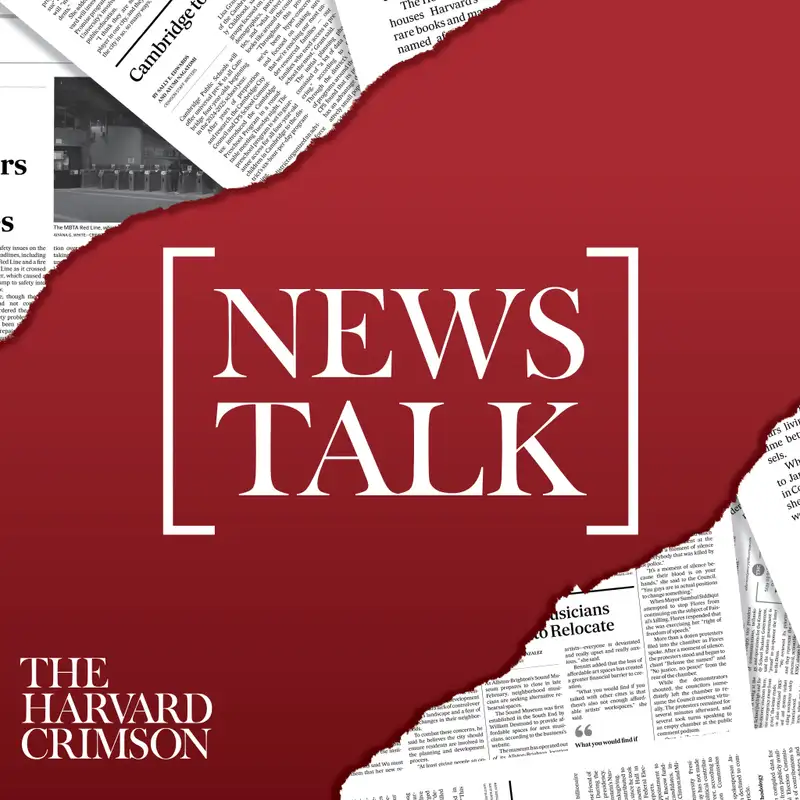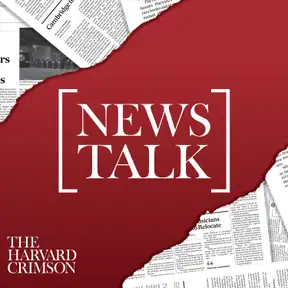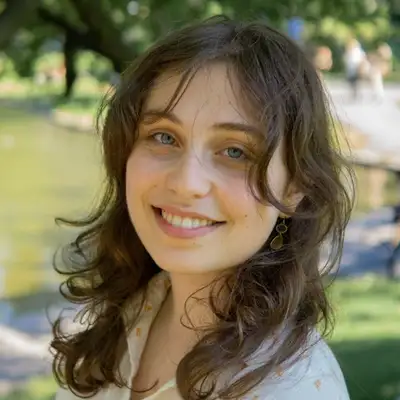
Harvard Admissions After Affirmative Action
Two weeks ago, 1,245 students opened admissions letters welcoming them to Harvard's class of 2028. But several aspects of this admission cycle are drastically different from past years. It's the first admission cycle after the Supreme Court struck down affirmative action last summer, and Harvard had increasingly come under fire as an institution for a disastrous response to campus tensions from the Israel Palestine war. So what is the state of Harvard's admissions in 2024? And where are we headed next?
Yael S. Goldstein:Two reporters join us to discuss. From the Harvard Crimson, I'm Yael Goldstein, and this is Newstalk.
Matan H. Josephy:My name is Matan Josephy.
Elyse C. Goncalves:And I'm Elyse Goncalves, and we're the admissions and financial aid reporters for the Harvard Crimson.
Yael S. Goldstein:Thank you so much for joining me, Matan and Elyse. This is the first admission cycle following the Supreme Court decision determining that Harvard's race based affirmative action program violated the equal protections clause of the 14th Amendment. Can you guys give me a sense of how this impacted Harvard's admissions process this cycle?
Elyse C. Goncalves:Essentially, at this point, we can't really say concretely how the fall of affirmative action has affected Harvard's admissions policies or admissions cycle this year. We know that they didn't have access to race based data throughout this process, but we don't know how or if that changed how they looked at applicants.
Matan H. Josephy:We'll definitely know more in the summer when we get demographic composition of the admitted class. There's a lot of speculation around it. People speculate that it might have affected Harvard's recruitment policies. We've seen shifts towards low income recruitment and rural recruitment as a response to the decision.
Elyse C. Goncalves:One of the things Matan was mentioning was the STORY program. So the STORY program is the Small Town Outreach Recruitment and Yield Consortium, and it's a group of approximately 30 colleges that Harvard has recently become a part of. Their goal is to focus on small town recruitment. It's pretty much in the name. And so that was a shift in Harvard's recruitment practices, so that's one of the shifts that Matan's kind of referring to.
Yael S. Goldstein:This isn't the first time we've seen affirmative action policies drop off. The UCs got rid of race conscious admissions in 1996. So what did they see, and how might that bear on what we might expect?
Matan H. Josephy:We spoke to Dr. Mitchell Chang, who is an expert on higher education from UCLA. And he kind of explained to us how in the mid 1990s, when the University of California Board of Regents voted to get rid of affirmative action, followed shortly by a statewide ballot proposition that ended the practice at public universities in California for good. There was a huge drop off in the enrollment of students who are black and who are Hispanic, and that was in large part that policy change. And it took the UCs decades to come back. It wasn't until 2020 or 2021 that this has returned to rates of minority enrollment that were comparable to what it had under race conscious admissions.
Matan H. Josephy:In a lot of the discourse around what schools around the country, but especially Harvard might see and the demographics of their admitted classes post affirmative action. The UCs are an example that's brought up a lot because it's a very, very, very prudent example of a high profile selective university system that in a pretty fell swoop, got rid of affirmative action policies and saw a huge change in their demographics as a result. But it's important to note that while the UCs may be a very good model for what Harvard will go through, the UCs are not a perfect example because they got rid of affirmative action policies in the nineties when most colleges in the United States still had them. So they had to basically compete for a fixed share of underrepresented applicants with schools that had affirmative action policies, which then put them at a disadvantage in terms of recruitment, in terms of application consideration, in terms of yield. Right now, every single school in the country can't use those policies anymore.
Yael S. Goldstein:Can we gain any insight from the UCs in how schools around the country, like Harvard will maintain a diverse student body?
Matan H. Josephy:We can look to some of what they did in terms of specific policies to see what next steps are for Harvard, and parallels are already pretty evident since Prop 209 took effect in California in the mid 1990s. The UC suspend hundreds of thousands of dollars in outreach programs, recruitment programs, efforts to bring students who are low income, who are first generation, who will likely result in a diverse class. It's a pretty simple principle, but we're already seeing that kind of emphasis shift at Harvard. Harvard has taken an aggressive approach recruiting in the past, and that is very much still going to stay the same in terms of a focus on recruitments of low income students, of students who are eligible for Pell Grants, who are their first in their family to go to college, who are from rural backgrounds, or even just from areas of the country that are maybe not as represented at Harvard as others. Harvard joining STORY, for example, is a pretty big sign that they're taking this outreach seriously, but even more seriously in the wake of her word of actions following.
Elyse C. Goncalves:We don't have exact socioeconomic data on Harvard's current class, but that could be telling once we are able to gather that. Right now, we know Pell Grant numbers. So what number of Harvard's admitted students in the class of 2028 are eligible Pell Grant recipients. This year, it was 21.7%, which is a rise from 19% last year. However, that number tends to fluctuate between 18, 17 to 22% every year.
Elyse C. Goncalves:So it's not necessarily indicative of a a huge shift in socioeconomic diversity at Harvard. But looking at those numbers has at least some indication of what Harvard's socioeconomic diversity looks like in this class and how their recruitment policies have worked.
Matan H. Josephy:The UCs did file a brief in the Supreme Court case when Harvard was sued that very explicitly mentioned that even in the wake of affirmative action following the UC system in the nineties, nearly 30 years of experimentation of finding out what policies exactly can help foster a diverse admitted class without the use of race was not a total success. That recruitment programs and outreach efforts have made enormous progress in fostering a diverse class at the UC system. But at the end of the day, they have had enormous trouble and have gone through decades of rigorous experimentation to replicate the success they had in fostering such diversity under race conscious admissions. That to me is always the most striking fact that if even the UC system can have such trouble in replicating the racial composition of other admitted classes in the years following the fall of their affirmative action policies, I think that really cements the fact that the racial composition of Harvard's admitted classes will change going forward.
Yael S. Goldstein:So we've talked about a major change. What's generally stayed consistent in Harvard admissions?
Matan H. Josephy:I think that you can split the consistencies in the admission cycle this year into two big categories. The first is policy, and the second is interest. Policy wise, a lot of the changes that may have happened as a result of supreme court case within the admissions office are things that we likely will never know about because they're they're legalistic. It's changes in how they discuss race, how they view essays about race, how they mentioned demographic portions of the class within deliberations. Those are things that we don't really know about.
Matan H. Josephy:But policy wise, at least on paper, I mean, a lot of the process is the same. The most glaring one is Harvard's test optional policy. They've committed to being test optional and not requiring the SAT or ACT for applications to Harvard through the admitted class of 2030. But even beyond that, we've spoken to to several experts and admissions consultants who have been a pretty strong sense reiterated that despite the kind of crazy year that Harvard has had, applicants' interest in the college has stayed high. We we saw that with application numbers.
Matan H. Josephy:Harvard didn't see a record number of applicants, but the the drop wasn't unexpected. It was consistent with past trends. And that indicates that even amidst all of this controversy and changes to the application cycle, to financial aid, in the form of debacles around FAFSA, interest in Harvard is pretty strong still, and that's been the biggest consistency.
Yael S. Goldstein:Were these drops in applications relatively consistent between the early action and the regular admissions process?
Elyse C. Goncalves:Early applications this year saw a 17% drop from the 2023 admission cycle. That was a more significant drop in application numbers than the regular decisions, which had an approximately 5% drop from last year, which was consistent with a 7% drop from the class of 26 to the class of 27. However, regular applications didn't see a similar decrease. It was a slight decrease from last year, around 2 to 3%. And overall, there was a 5% decrease total in applications from last year to this year.
Elyse C. Goncalves:So although early applications saw a large decrease, regular and overall application numbers did not change very much.
Yael S. Goldstein:Did we see a difference in donor and alumni reactions between the different rounds of admission?
Matan H. Josephy:I think that in general, comparison of those kinds of reactions is is a little bit difficult. Harvard is definitely still under a microscope, but it's a different kind of microscope than it was when EA results came out just weeks after Claudine Gay had had gone to congress. But in general, the reaction at least anecdotally, given the relatively pronounced drop in early applications this year, was a lot stronger than it may have been for the regular results. Early application results came in and you had people like Bill Ackman, who have been very prominent critics of the university, tweeting about what this may mean. Outlets like the New York Post coming in and really putting that out there.
Matan H. Josephy:And there was definitely press coverage of the regular decision results this year. But the reaction, at least from the side of donors, of critics and alumni, has been a lot more muted given both the state of the university right now and in general, maybe the relatively less pronounced drop in applications than early applications saw.
Yael S. Goldstein:Did either of you talk to any administrators about their insights into the admissions process?
Elyse C. Goncalves:So the day Harvard admissions decisions were released, we spoke to dean William Fitzsimmons, who is the dean of admissions and financial aid at the college, about Harvard's data, about what we can expect for the admission cycle, and what Harvard's admissions processes were like this year.
Matan H. Josephy:Our biggest takeaway from our conversation with him, at least with regards to how this current cycle went, was that even amidst all of this crisis and controversy that Harvard has gone through over the past year, he's pretty pleased. They got through it without a precipitous decline in application numbers. Interest in Harvard among applicants was strong and remained strong. Even as the office went through arguably one of the biggest changes in policy that has gone on in admissions in decades, it weathered it. It admitted a class that it's confident in and that the office is happy with.
Matan H. Josephy:It was striking to sit with him in a room with with this guy who has seen Harvard through so many years of admissions policies and cycles of applications. And to see him say that even after all of this controversy and all of this tumultuous time, he can say with confidence that he is pleased and proud of the class of 2028.
Elyse C. Goncalves:We also got the opportunity to ask Dean Fitzsimmons about yields rate this year. And he said, quite frankly, that he doesn't know whether yield will rise or fall in the face of everything that Harvard has gone through this year. And so I think a lot of our conversation left a lot of things up in the air. They don't have access to race data. They don't know what yields will be.
Elyse C. Goncalves:Our conversation left us with a lot of questions going into the summer.
Yael S. Goldstein:And those questions are gonna be answered by the class of 2028 themselves. They're coming to visit Harvard campus on April 14th for Visitas. Can you guys explain what Visitas is and what effect that might have on the class of 2028's decision?
Matan H. Josephy:Visitas is the weekend in April held every year where the admitted class can come in and get to know the campus. Students are encouraged, but not required to stay with a student at the college, of any class level, freshman to senior. They eat at the dining halls. They go to classes. They go to events held by the admissions office. They call it the college and student organizations. And it's really just an opportunity for high school seniors who are making probably one of the biggest decisions of their lives to get a sense of what they're gonna get if they come to Harvard.
Elyse C. Goncalves:Visitas is an opportunity for the class of 2028 to meet each other. A lot of people have group chats and ways to contact each other on Instagram. We spoke to a lot of students who were recently admitted, and they talked to us about how they've already started talking to their future potential classmates. But Visitas is a chance for a lot of these students to meet each other in person.
Yael S. Goldstein:So it seems like the class of 2028 has a lot to look forward to, but I I know you guys talked to some of them about their reactions when they received their admissions letters. And I'm wondering if you can share some of the best reactions you you heard about.
Elyse C. Goncalves:I mean, I have one that was pretty shocking. I spoke to a student, Eric Lee, who is a senior at Deerfield, and he was in his dorm common room with a bunch of his friends at the time. And he sits on the couch, his friends are surrounding him. He opens the letter, he sees he was accepted, his friends jump up screaming. He jumps up screaming. And there's a video where they all visibly lift him into the air, and they're all screaming. And you see him constantly adjusting his glasses in the video. And later when I spoke to him, he clarified, because they were jumping and screaming so hard that they fell off his face, but it's a small price to pay. A few other students talked to us about their experience. A few students mentioned crying or being on the verge of tears, getting their acceptance letter. A lot of people had really moving, exciting stories, and then afterwards, immediately called family, called friends. There's a huge common sentiment of just being overwhelmed with joy and wanting to reach out to their closest people.
Elyse C. Goncalves:I'll also add that we asked everyone who we interviewed about recent controversy that Harvard has faced and if that affected their, decision to apply or their decision to commit. Most students said that even though they read about Harvard's controversies and even though they heard a lot about what was happening at Harvard, it didn't dissuade them from applying because Harvard is a place of open thought. And the only place they can change the way Harvard perceives things, the only way they can change the way in which Harvard deals with crisis is from actually making a change from within. And so on behalf of all these students, welcome to Harvard. Welcome to Harvard.
Yael S. Goldstein:Thank you so much, Matan and Elyse, for joining me to talk about the efficient cycle for the new class of 2028.
Matan H. Josephy:Yeah. Thank you so much.
Yael S. Goldstein:This episode of Newstalk was hosted by Yael S. Goldstein. Producers of this episode are Olivia G. Stringham and Yael S. Goldstein. Our multimedia chairs are Julian J. Giordano and Addison Y. Liu.
Yael S. Goldstein:Our associate managing editors are Claire Yuan and Elias J. Schisgall. Our managing editor is Miles J. Herszenhorn, and our president is J. Sellers Hill. Music in this episode was produced by Bea Wall-Feng. From Plympton Street, this is Newstalk.



